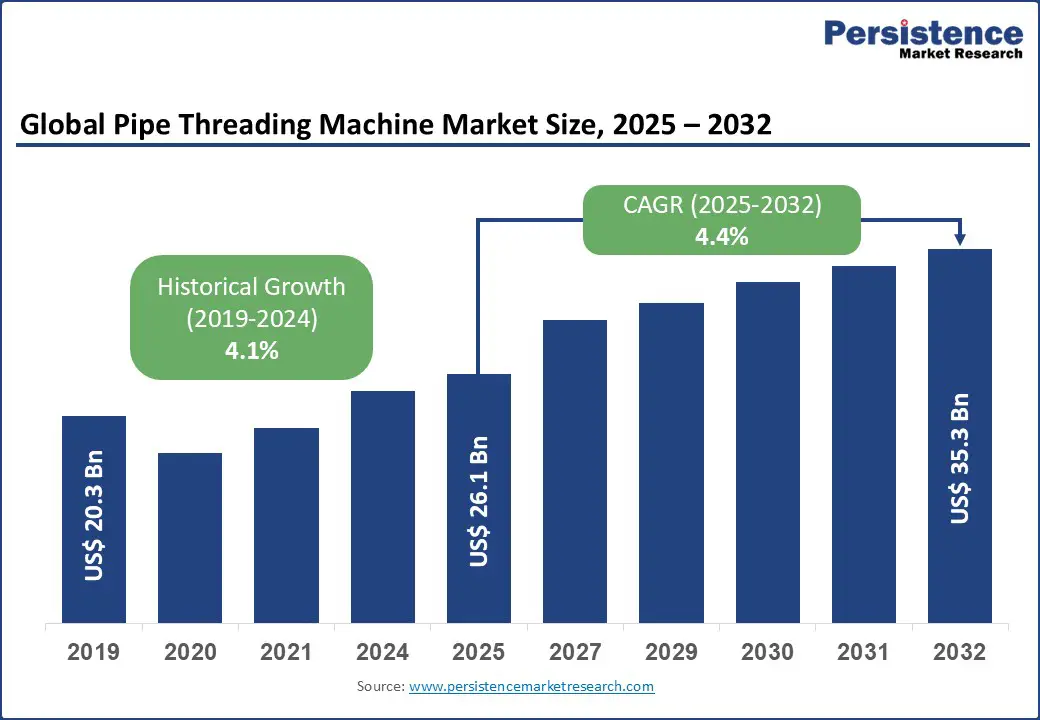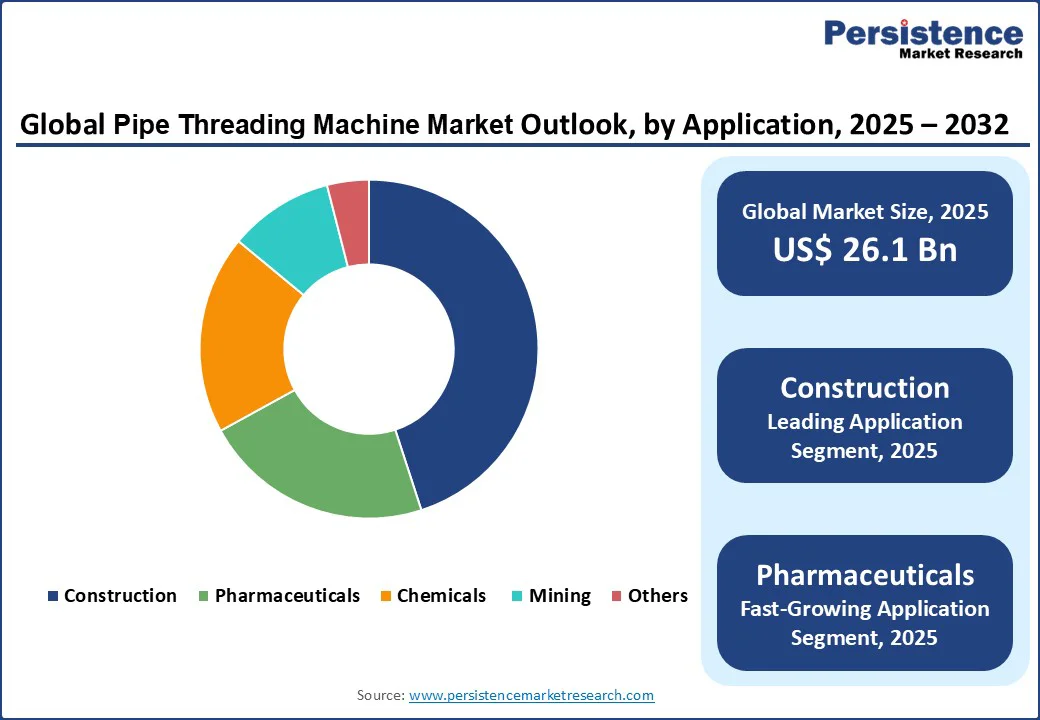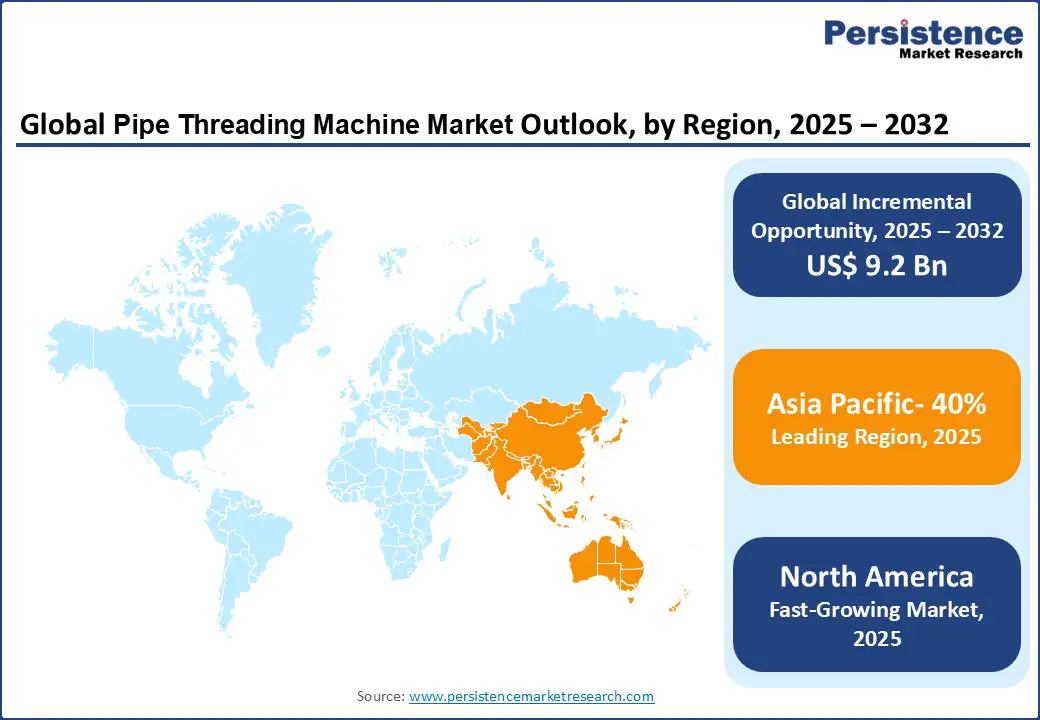ID: PMRREP11326| 186 Pages | 17 Sep 2025 | Format: PDF, Excel, PPT* | Industrial Automation

The global pipe threading machine market size is likely to be valued at US$26.1 bn in 2025. It is expected to reach US$35.3 bn by 2032, growing at a CAGR of 4.4% during the forecast period from 2025 to 2032, driven by rapid infrastructure development, industrial automation, and investments in smart cities, pipelines, and manufacturing facilities.
Key Industry Highlights:

| Key Insights | Details |
|---|---|
| Pipe Threading Machine Market Size (2025E) | US$26.1 Bn |
| Market Value Forecast (2032F) | US$35.3 Bn |
| Projected Growth (CAGR 2025 - 2032) | 4.4% |
| Historical Market Growth (CAGR 2019 - 2024) | 4.1% |
Rapid infrastructure development across emerging and developed economies is driving the demand for pipe threading machines. Governments are heavily investing in smart cities, industrial corridors, and transport modernization projects, which require extensive use of piping systems for water supply, gas distribution, and sewage management.
For instance, India has approved large-scale industrial smart city projects worth thousands of crores under the National Industrial Corridor Development Programme. At the same time, budget allocations for roads, railways, and housing continue to rise each year. Such initiatives directly increase the requirement for reliable pipe networks, thereby fueling the adoption of efficient pipe threading machines.
In parallel, industrial automation is reshaping how pipelines are installed, monitored, and maintained. Automation technologies such as SCADA systems are being deployed by urban local bodies to manage water and utility pipelines with real-time precision.
This shift reduces human error, enhances productivity, and raises the demand for machines capable of delivering accurate and consistent threading. Consequently, the integration of automation with infrastructure expansion is creating significant growth opportunities for the pipe threading machine market.
High initial investment remains a significant restraint in the pipe threading machine market. Advanced threading equipment with automated controls and precision tooling often comes with high purchase costs, which can be a barrier for small and medium-sized enterprises. Additionally, the requirement for skilled operators and training further adds to the upfront expenditure, limiting adoption among budget-conscious users.
Alongside high capital costs, maintenance challenges also hinder market growth. Pipe threading machines are exposed to heavy workloads, frequent vibrations, and wear of cutting tools, leading to recurring service and part replacement. Regular lubrication, alignment, and tool sharpening increase downtime and operational expenses. These ongoing costs often discourage smaller contractors and firms from adopting or upgrading to advanced threading systems.
The pipe threading machine market is witnessing strong opportunities in emerging markets, where rapid urbanization and industrialization are fueling large-scale infrastructure projects. Countries in Asia-Pacific, Latin America, and Africa are investing heavily in housing, transportation, energy, and water distribution networks, creating substantial demand for piping systems.
As governments expand smart city initiatives and industrial corridors, the need for efficient, durable, and cost-effective pipe threading solutions is expected to grow significantly in these regions.
Technological advancements are another key opportunity shaping the industry. Innovations such as CNC-enabled threading machines, portable and lightweight models, and integration of automation and IoT are enhancing productivity and precision. These advancements not only reduce operational errors but also minimize downtime, making them highly attractive for industries seeking efficiency and long-term cost savings.
In 2025, automatic pipe threading machines approximately a 55% share, primarily due to their speed, accuracy, and ability to manage large-scale operations. Industries such as construction, oil & gas, water distribution, and manufacturing increasingly favor these machines for their consistent performance and reduced reliance on manual labor. The growing need for precision and efficiency in infrastructure projects continues to drive their widespread adoption.
At the same time, the automatic category represents the fastest-growing segment. Supported by innovations in CNC technology, smart controls, and enhanced safety features, these machines deliver superior productivity with minimal downtime. Their reliability, cost-effectiveness, and advanced capabilities make them the preferred solution for modern industrial and infrastructure applications.
In 2025, steel holds the dominant position in the pipe threading machine market with a 50% share. Its strength, durability, and wide availability make it the preferred material for manufacturing robust and heavy-duty threading machines. Steel-based machines are especially valued in industries such as oil & gas, construction, and utilities, where consistent performance and resistance to wear and tear are essential for large-scale operations.
Meanwhile, aluminum is emerging as the fastest-growing material segment. Its lightweight nature, corrosion resistance, and ease of handling are driving adoption, particularly in portable and mobile pipe threading machines. The growing demand for energy-efficient and easy-to-transport solutions is accelerating the shift toward aluminum, making it an increasingly attractive option in both developed and emerging markets.
In 2025, the construction sector leads the pipe threading machine market with a 45% share, driven by extensive infrastructure projects, residential and commercial real estate development, and utility installations. The sector’s demand for reliable piping in water supply, gas distribution, and drainage systems fuels consistent use of threading machines, making construction the largest application segment worldwide.
On the other hand, the pharmaceutical industry is emerging as the fastest-growing segment. The sector’s increasing need for high-quality, contamination-free piping in cleanrooms and manufacturing facilities is accelerating the adoption of advanced threading solutions. With rising investments in pharmaceutical production and healthcare infrastructure, this segment is projected to witness significant growth in the coming years.

North America is projected to be the fastest-growing region in the pipe threading machine market, supported by robust investments in infrastructure modernization, oil & gas exploration, and advanced manufacturing. The region’s strong focus on automation, adoption of smart construction technologies, and demand for high-performance machinery are driving market expansion.
In addition, government initiatives to upgrade water supply networks, renewable energy projects, and pipeline infrastructure are further fueling the need for efficient threading solutions. With the presence of leading manufacturers, technological innovation, and rising replacement demand for aging infrastructure, North America is poised for sustained high growth in the forecast period.
Europe holds a significant share of the pipe threading machine market, supported by its well-established industrial base and strong focus on sustainable infrastructure development. The region’s demand is driven by extensive pipeline networks for water, gas, and energy, alongside the ongoing modernization of urban infrastructure.
Strict regulatory standards on quality and safety also encourage the adoption of advanced and efficient threading machines. Additionally, Europe’s leadership in engineering innovation and the presence of several key manufacturers contribute to its strong market position. With continued investments in smart cities, renewable energy, and industrial automation, Europe is expected to maintain a solid market share.
Asia Pacific dominates the pipe threading machine market with a 40% share in 2025, driven by rapid urbanization, industrialization, and large-scale infrastructure investments. Countries such as China, India, and Southeast Asian nations are leading the demand with massive projects in housing, transportation, energy, and water supply networks.
Government initiatives promoting smart cities, industrial corridors, and manufacturing expansion further accelerate adoption. The region also benefits from the availability of cost-effective labor, rising construction activities, and a strong manufacturing ecosystem. As infrastructure growth continues at an unprecedented pace, the Asia Pacific is expected to retain its leading position in the global market.

The global pipe threading machine market is characterized by strong consolidation, with a few global manufacturers holding a significant share through advanced product portfolios and technological expertise. These companies focus on innovation in automation, precision tooling, and portable solutions to cater to diverse industrial needs.
Regional players, meanwhile, compete on cost efficiency and localized distribution networks. Strategic initiatives such as product upgrades, capacity expansion, and partnerships are shaping competition, with innovation-driven differentiation becoming the key growth driver. .
The pipe threading machine market is projected to reach US$26.1 bn in 2025, driven by infrastructure development and automation.
Rapid infrastructure growth, industrial automation, and demand for precise piping systems fuel market expansion.
The pipe threading machine market will grow from US$26.1 bn in 2025 to US$35.3 bn by 2032, with a CAGR of 4.4%.
Expansion in emerging markets and technological advancements in automation and eco-friendly materials drive growth.
Leading players include Rothenberger India Pvt. Ltd., REX Industries Co., Ltd., Raptor Cutting Tools Inc., EGA Master, J&K Tool Company Inc., United Machine Tools, Superior Thread Rolling Company Inc., Wheeler-Rex, Industrial Machinery Corporation, and Hangzhou Hongli Pipe Machinery Co., Ltd.
| Report Attribute | Details |
|---|---|
| Historical Data/Actuals | 2019 - 2024 |
| Forecast Period | 2025 - 2032 |
| Market Analysis | Value: US$ Bn, Volume: As Applicable |
| Geographical Coverage |
|
| Segmental Coverage |
|
| Competitive Analysis |
|
| Report Highlights |
|
By Operation
By Material Type
By Application
By Region
Delivery Timelines
For more information on this report and its delivery timelines please get in touch with our sales team.
About Author